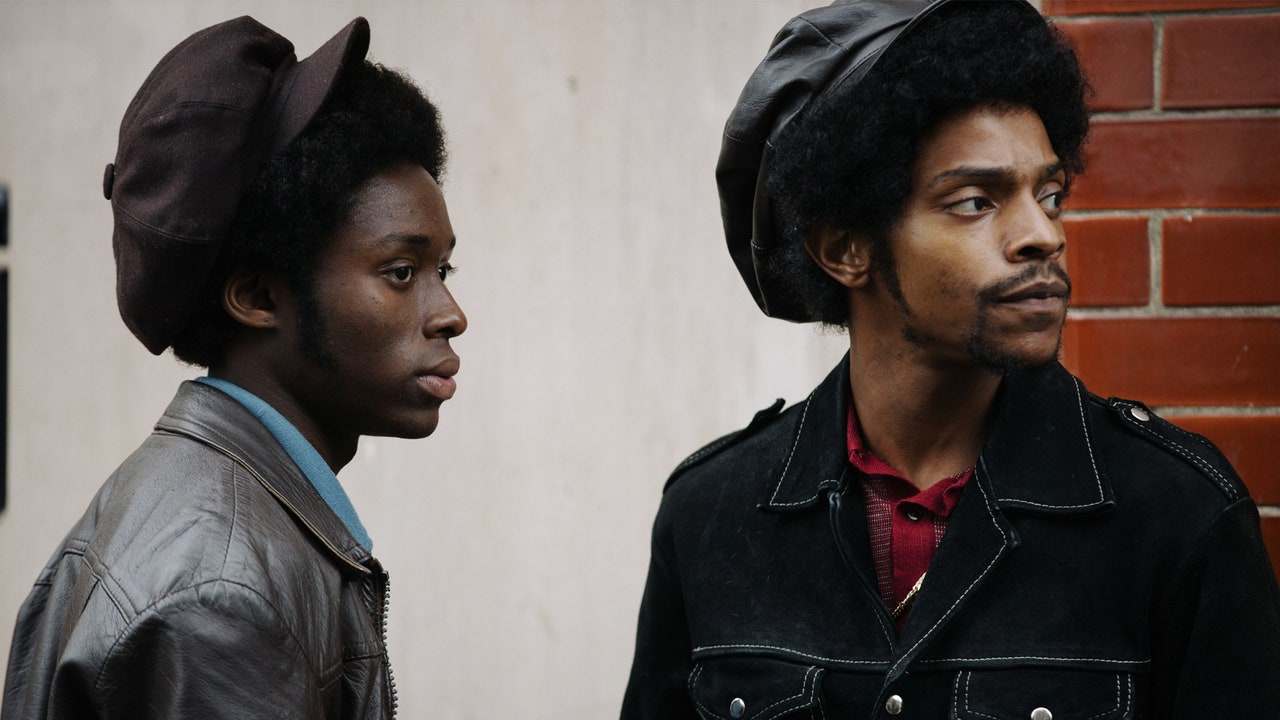Alex Wheatle is not only a real person, but a beloved author, most recently of the young adult novel Cane Warriors. His first and perhaps best-known book, Brixton Rock (1999), is semi-autobiographical; it follows a 16-year-old boy in South London in the 80s who, like Wheatle, grew up in a children’s (or foster) home. Wheatle’s own childhood was somewhat bleaker than his character’s. While the book’s protagonist, Brenton Brown, eventually reunites with his mother, Wheatle’s mother—who already had a family in Jamaica when she became pregnant with him in London—did not respond to the state’s attempts at contact. Wheatle’s father was the one who placed him in foster care.
The author, now 57, also happened to be a member of Small Axe’s writing room when a film about his life, the penultimate installment of director Steve McQueen’s five-part series, was conceived. Its possibilities only became apparent when McQueen asked Wheatle to share more of his experiences growing up in London. The abuse he endured as a child, and the written records of the state’s negligence towards him while in their care, were startling to McQueen and Alex Wheatle co-writer Alastair Siddons. But Wheatle also found his way to the Brixton music scene, where he began DJing, developing street smarts, and getting in touch with his roots. It’s the Brixton influence on Wheatle’s life that furnishes the film with the cultural and aesthetic specificity that’s been Small Axe’s hallmark.
Alex Wheatle begins at a major turning point in the author’s life, when just after the Brixton Riots of 1981, Wheatle (played in the film by newcomer Sheyi Cole) was sent to prison for 6 months. His cellmate is an older Rastafarian with terrible indigestion who is able to subdue the traumatized young man and recommend some vital reading. Most notably, he hands Wheatle Trinadadian scholar C.L.R. James’ The Black Jacobins, about Toussaint L’Ouverture’s 18th century slave revolt and the subsequent Haitian revolution. But Alex Wheatle (which, according to an interview with the Guardian, Wheatle himself declined to write, feeling too close to the material) is more interested in the reverberation of Wheatle’s personal trauma, and how that explains his present behaviors, than the riots themselves, or James’ work and legacy. As a result, Wheatle, the real person—who is, to this day, deeply interested in radical Caribbean history and politics—gets lost in the shorthand rhythms of the biopic.
It’s up to a director to shear a biography of nostalgia and alight on its most stirring themes and vital images. But Alex Wheatle has both an aesthetic and thematic conservatism that allows what McQueen insists on calling a standalone film—as he does with the rest of Small Axe’s installments—to coast by like comforting TV. Though both versions of Wheatle, fictional character and real person, are politically radical and ceaselessly creative, McQueen and Siddons make his life into a fairly flat psychological text. We flash back to his dreadful childhood, where his white foster mother hits and gags him; in school, racist white classmates taunt him. Authorities lock him in a psychiatric institution. These horrific events are run through like a laundry list, cause and effect laid bare so as not to bore even the flakiest of viewers.
Alex Wheatle belatedly finds it footing when it dares to zoom out. A series of archival images show bystanders outside of a burned building, mourning families burying their loved ones, and mass protests. This is the aftermath of the New Cross fire, which killed 13 young Black people and helped spark the Brixton Riots in the midst of Margaret Thatcher’s deleterious tenure. Yet the film covers the riots only briefly. More attention is given to the anticipation of Wheatle’s arrest, and to the Rastafarian’s lecture to Wheatle, laying out Britain’s class-based system of imported cheap labor—which in turn explains the systemic oppression of Black people in the country. The only way out of the cycle is to self-educate, he insists to Wheatle.
It’s an apt speech, but one that tries to do the work of the entire film in a few minutes. It’s difficult not to walk away from Alex Wheatle curious about how the real Wheatle would’ve written it.
All products featured on Vanity Fair are independently selected by our editors. However, when you buy something through our retail links, we may earn an affiliate commission.
— Cover Story: Stephen Colbert on Trump Trauma, Love, and Loss
— Rosario Dawson Tells All About The Mandalorian’s Ahsoka Tano
— The 20 Best TV Shows and Movies of 2020
— Why The Crown Season Four’s Prince Charles Appalled Royal Experts
— This Documentary Is the Real-World Version of The Undoing, but Better
— How Hero Worship Turned to Scorn in the Star Wars Fandom
— In Light of The Crown, Is Prince Harry’s Netflix Deal a Conflict of Interest?
— From the Archive: An Empire Rebooted, the Genesis of The Force Awakens
— Not a subscriber? Join Vanity Fair to receive full access to VF.com and the complete online archive now.
